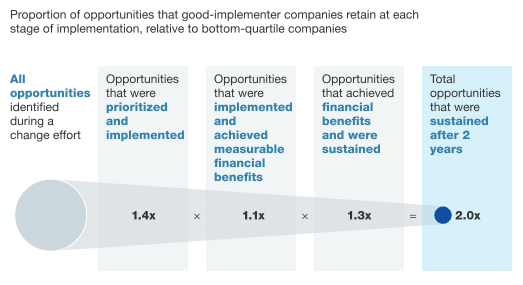A new McKinsey Global Survey asked executives about seven core implementation capabilities and found striking results: “Good implementers—defined as companies where respondents reported top-quartile scores for their implementation capabilities—are 4.7 times more likely than those at the bottom-quartile companies to say they ran successful change efforts over the past five years. Respondents at the good implementers also score their companies around 30 percent higher on a series of financial-performance indexes. Perhaps most important, the good-implementer respondents say their companies sustained twice the value from their prioritized opportunities two years after the change efforts ended, compared with those at poor implementers.”
The survey found three specific practices common to the world’s best implementers:
Ownership and Commitment: “Leaders devote appropriate time and energy to support major change, often clearing their diaries to drive efforts in a hands-on manner and inspire their colleagues. They also role model the right behaviors to support the change, commonly by demonstrating the difficult act of making personal behavioral changes.”
Prioritization and Planning: “Line managers use tools such as value-driver trees to ensure employees spend the majority of their time on the organization’s priorities. They communicate at all levels about which actions and outcomes are most important to the organization’s shareholders, customers, and other stakeholders, and they have set intervals to review individual efforts toward the organization’s priorities.”
Accountability: “Line managers eliminate performance variability through tight monitoring and quick responses. This includes effectively using key performance indicators that the organization tracks at the right frequency, conducting regular performance discussions with teams, and regularly assessing employees against individual goals and targets.”

